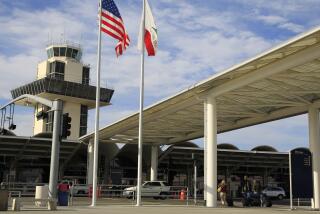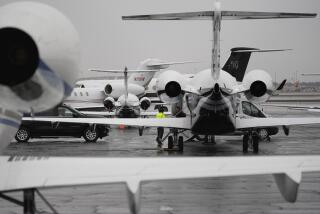Reno Air Withdraws Plans for Early Morning Flights
- Share via
BURBANK — Saying it wanted to “be a good neighbor” to Burbank residents, Reno Air announced Monday that it is dropping plans for a 6:40 a.m. flight, delaying the takeoff until 7 a.m. to observe Burbank Airport’s voluntary noise restrictions.
Reno Air had asked the nine-member, Burbank-Glendale-Pasadena Airport Authority last week to approve the early morning flights in an effort to better compete against other airlines traveling to the Bay Area and Silicon Valley.
But the Nevada-based carrier quickly backtracked after dozens of local residents vowed there would be a strong backlash against any attempt to bust the airport’s voluntary 10 p.m. to 7 a.m. curfew. Airport noise is a volatile political issue in Burbank and the city has been waging a running fight with the airport in the courts for years.
Reno Air will launch service Thursday from Burbank to its San Jose hub under Monday’s 4-3 approval vote by the airport commission. The flights will now take off at 7 and 10:35 a.m., and at 3 and 5:50 p.m., airline executives said.
John Albrecht, Reno Air’s director of airport affairs, said the airline did not want to appear insensitive to the noise complaints of local residents. But he also had harsh words for the voluntary curfew, which allows some airlines to continue early departures while others like Reno were pressured out of them.
“I’ll gladly work with a system that’s voluntary,” Albrecht said, adding that Reno Air had done nothing to violate federal noise laws. But he added: “It’s a disturbance to the airlines and the [householders] who live around the airport” not to have mandatory requirements that apply to all.
Currently, three airlines--United, America West and Alaska--schedule flights that depart between 6:30 and 6:40 a.m. To date, citizens groups have not targeted them for protests.
Airport administrators insist that none of the early departures violate current noise standards and that there are fewer early-morning flights now than in past years.
They also pointed out that John Wayne Airport in Orange County and Lindbergh Field in San Diego also have dozens of similar early-morning flights.
Pasadena Mayor Chris Holden, one of his city’s three representatives on the airport authority, urged the panel to do a better job of ensuring airlines with pre-7 a.m. flights understand the noise impact on the surrounding community.
Holden also directed the airport commission staff to research what is known in aviation circles as a Part 161 study, the only means by which the Federal Aviation Administration can approve flight restrictions at the nation’s airports, including caps, curfews and other curbs on flight operations.
“This is what Burbank [city government] has been asking for,” said an airport official, who asked not to be named. “The question is, will they cooperate with the study and agree to live by the outcome?”
Burbank Airport Commissioner Charles Lombardo said the study was not necessary if all airlines would agree in writing not to take off or land during the curfew period.
“There’s legalities and then there’s realities,” Lombardo said. “Legally, we could not have prevented Reno Air from taking off at 6:40 a.m. But realistically, the negative publicity made them rethink the departure time.”
Burbank city leaders and residents said they were heartened by Reno Air’s decision and they would continue to push others to do the same.
“The response of the community is what really impressed me. Score one for the home team,” said James Arone of a local airport watchdog group, Citizens United of Burbank. “I am glad Reno Air listened to what the residents had to say. I think it shows a willingness to try to be cooperative. This should serve as a message to the other airlines.”
“I think everybody should take notice that Burbank is not getting tired of this fight,” added Burbank Vice-Mayor Stacey Murphy following the commission meeting. “People in this community are going to do whatever it takes to get mandatory neighborhood protection in place.”
More to Read
Inside the business of entertainment
The Wide Shot brings you news, analysis and insights on everything from streaming wars to production — and what it all means for the future.
You may occasionally receive promotional content from the Los Angeles Times.










